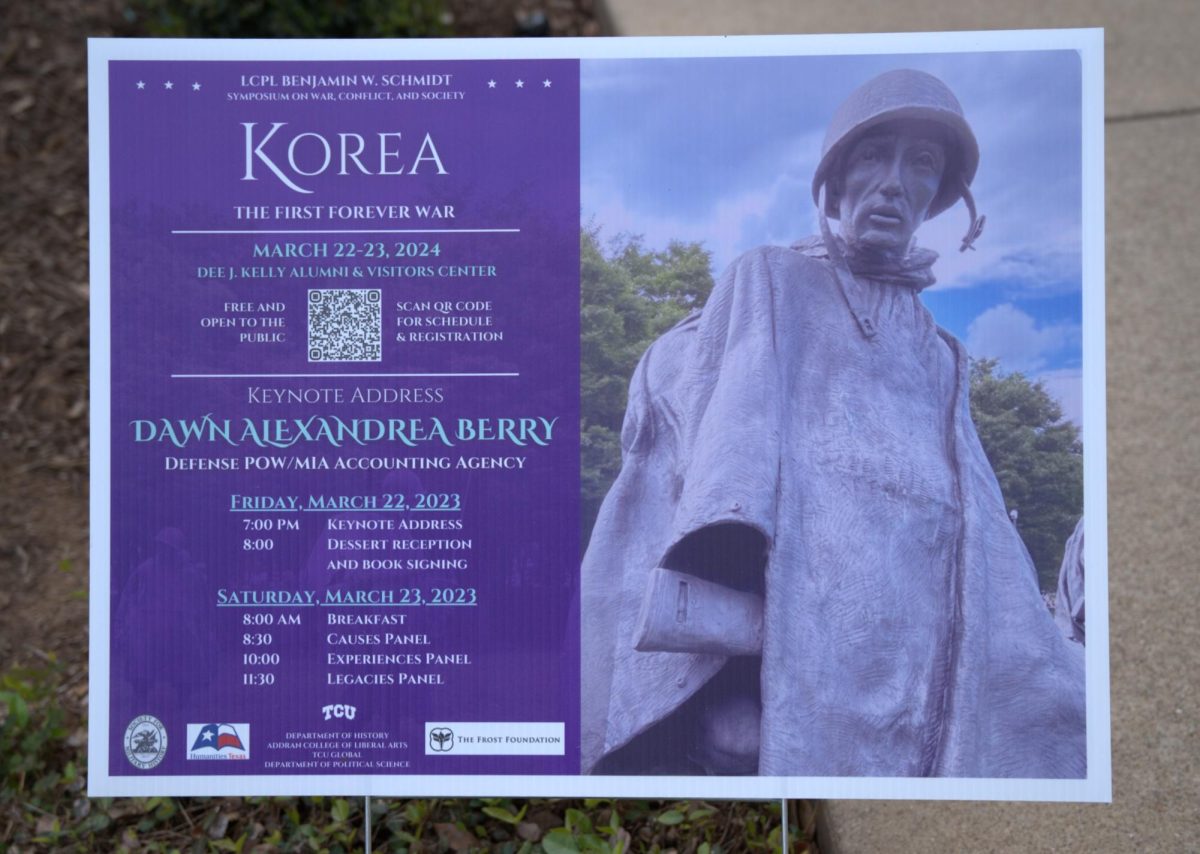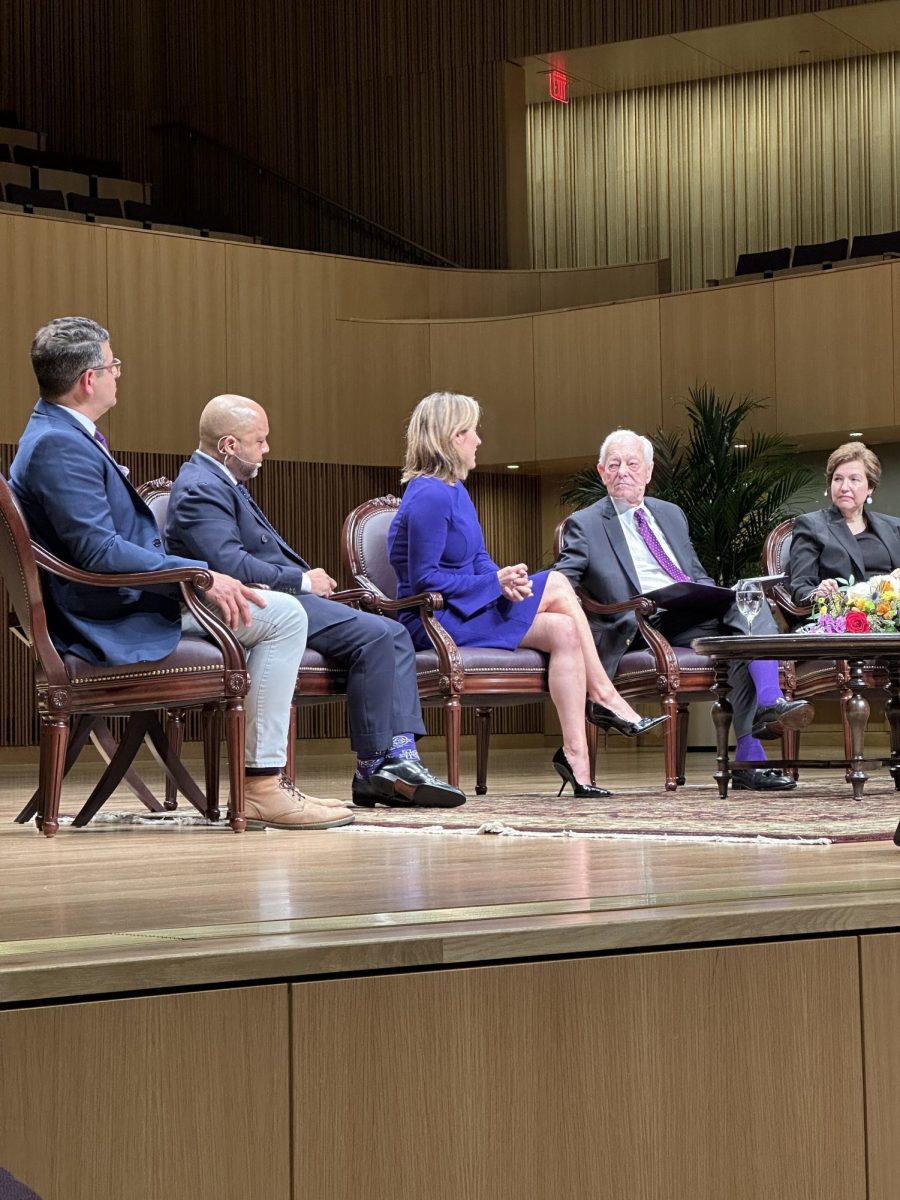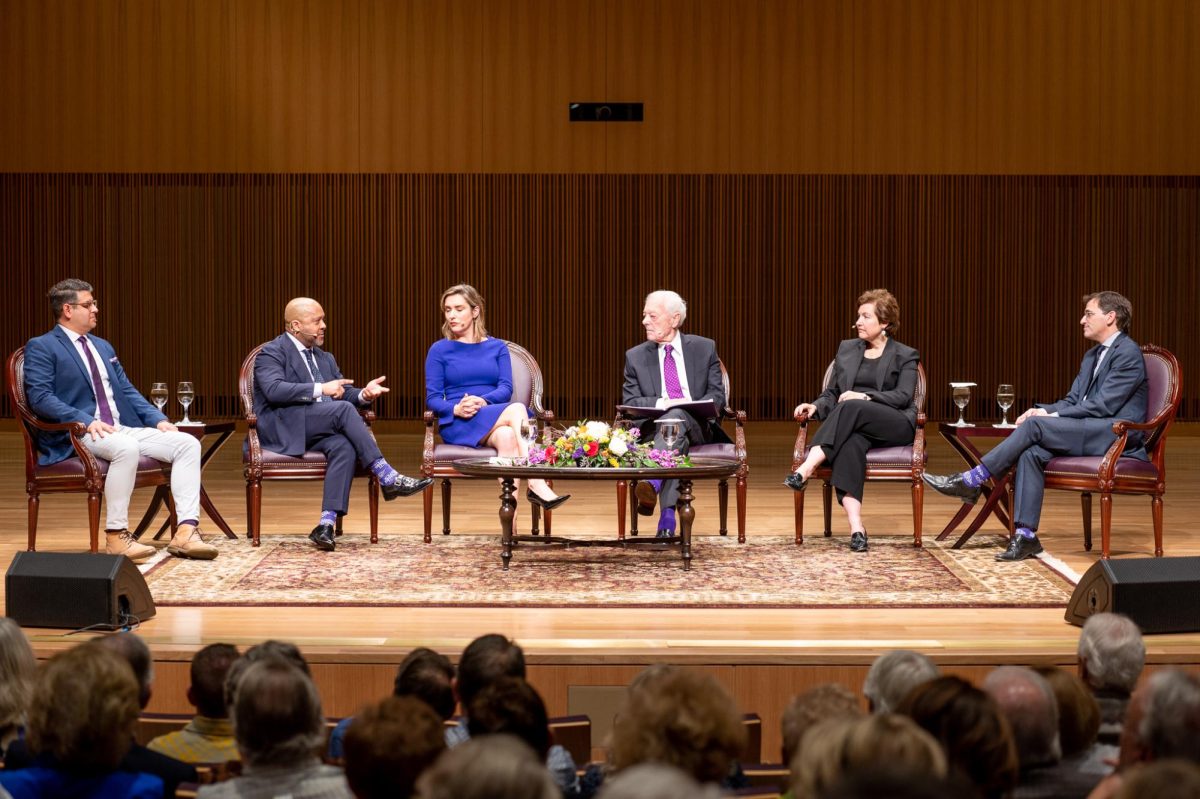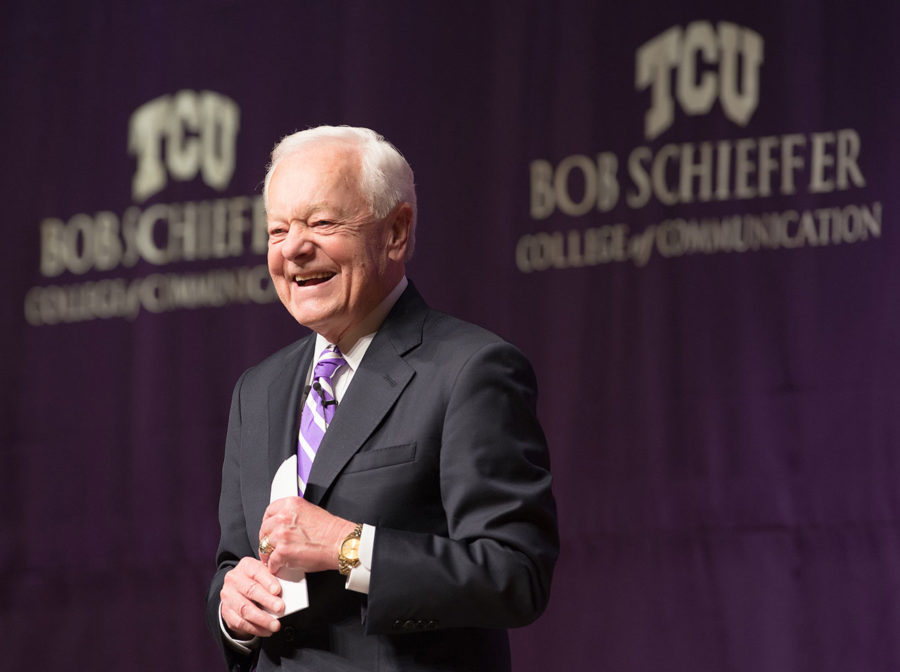It started March 1, 2005 – 10,000 attendees and 35 industry renowned panelists later, the Schieffer Symposium continues to discuss the state of journalism and prevalent issues within the media.
That first symposium followed the naming ceremony for the Schieffer School of Journalism, as TCU recognized the former Skiff reporter who graduated in 1959.
This year, Schieffer’s name is emblazoned on the outside of Moudy South. The entire college was renamed the Bob Schieffer College of Communication. And there was room from an overflow audience of 300 at the Brown-Lupton University Union to accommodate those who couldn’t get one of the 1,200 seats in Ed Landreth Hall.
With the exception of 2009, the symposium was always held in Ed Landreth. That year, it was being renovated and the conversation moved to the BLUU.
This year’s symposium featured Peggy Noonan, author and columnist for the Wall Street Journal, Jane Pauley, former anchor on the Today show and former co-host for Dateline NBC, Scott Pelley, CBS Evening News anchor and managing editor, and Bob Woodward, associate editor of The Washington Post.
Before the event got underway, Pelley broadcast the “CBS Evening News” live from the convergence lab in Moudy South.
“The State of American Journalism”
Tom Brokaw, former anchor of NBC News Nightly, Tom Friedman, former foreign-affairs columnist and former chief White House correspondent for The New York Times, Jim Lehrer, anchor and executive editor on The NewsHour with Jim Lehrer and Bob Woodward, associate editor for the Washington Post, made up the first panel.
“Forget me,” Friedman said at the time. “I would pay to hear the other four guys speak.”
Schieffer moderated as the five men discussed the media’s role in politics and war coverage.
“The red state/blue state phenomenon is real. Even in foreign policy there is a perception of a red state foreign policy and a blue state foreign policy,” Woodward said. “The problem in journalism is that we can’t get in the uniform. We can’t have red state journalism and blue state journalism.”
On that day, it was also announced that Schieffer would be the interim anchor of CBS News.
“The Changing Communications Landscape”
Schieffer invited Jill Abramson, then-managing editor for The New York Times, Len Downie, then-executive editor for The Washington Post, Larry Kramer, then-president of CBS Digital Media and Judy Woodruff, co-anchor of PBS’ The NewsHour with Jim Lehrer.
The panel discussed the future of media and how the media platform is changing.
“More is going to be on demand and that’s what the younger generation has come to expect,” said Woodruff in regards to new ways of getting the news. “They can turn on their computer at 3 o’clock in the morning or whatever time and get it that way. It’s going to be what you want, when you want it.”
Schieffer told the audience that even though no one knows where the news will be in the next five to 10 years, the basics of journalism will remain the same.
“No matter what medium we get our news from,” Schieffer said, “the integrity of the individual reporter – that is the thing that will make journalism useful.”
“Life, Liberty and the Pursuit of the News: The Media’s Role in a Democracy”
Earl G. Graves, founder of Black Enterprise magazine, Jan Crawford Greenburg, then-legal correspondent for ABC News, Bill Keller, then-executive editor of the New York Times and the late Tim Russert, former managing editor and moderator of Meet the Press, discussed the need for free press and the presidential election.
“In a democracy, the news provides a second source of information about the government,” Schieffer said. “I believe we need a shield law so citizens can have a full, independent picture of what the government is doing.
“Is Campaign ’08 the Right Stuff?”
The election year panel featured Roger Mudd, former correspondent for CBS News and NBC News, the late Al Neuharth, founder of USA Today and the Freedom Forum and the late Robert Novak, then-syndicated columnist for the Chicago Sun-Times and commentator for Fox News and Bloomberg News.
“The situation is I am against the war in Iraq – I thought it was a huge mistake and I told Bush that and haven’t been invited to the White House since,” Novak said. “But the reason it is not a big issue anymore is because we don’t have a draft. The real issue is whether the American people are ready for an African-American president.”
“Obama and the Press: Is the media doing its job?”
Panelists David Brooks, columnist for The New York Times, Gwen Ifill, then-moderator and managing editor for PBS’ Washington Week, Trish Regan, then-anchor for CNBC’s The Call and economic reporter and analyst for NBC’s Nightly News and Today show, and Mark Shields, nationally syndicated columnist and commentator for PBS’ The NewsHour discussed Obama’s presidency and the role of the media.
The panelist debated bias in the presidential coverage.
“The press is obsessed with everything he says and everything she wears,” Ifill said of Obama and his wife, Michelle.
Brooks said the coverage was fair and most journalists are committed to journalism and not personal politics.
“They are hanging a lot on the outcome of everything he does and says and everything he wears and says,” Brooks said.
“A Gridlocked Congress and an Angry Public: What Now is the Role of the Media”
Schieffer played host to Ann Curry, then-co-anchor for Dateline NBC and the Today Show, New York Times columnist Maureen Dowd, Michael Eisner, CEO of The Tornante Company, and William Kristol, founder and editor of The Weekly Standard.
The panelists discussed the role of media coverage in a deadlocked Congress.
“GOP Candidates, the Government Shutdown and WikiLeaks”
Joe Scarborough and Mika Brzezinski, the hosts of MSNBC’s Morning Joe, Arianna Huffington, the co-founder and editor-in-chief of The Huffington Post, and Brit Hume, senior political analyst on the FOX News Channel discussed the future of social media and the Republican’s run for the White House.
“There isn’t one [candidate],” Brzeninski said. “They’re all flawed. And it seems surprising to me that there isn’t kind of a clear set of candidates on the Republican side, especially given how people feel.”
“Hot-Button Issues: Health Care, Vice Presidential Running Mates and Super PACs”
Schieffer invited John Harris, editor-in-chief and co-founder of POLITICO, Norah O’Donnell, then-CBS News Chief White House correspondent, Jake Tapper, then-ABC News senior White House correspondent, and Chuck Todd, NBC News chief White House correspondent.
“The race to the White House is going to be very close and very negative. Both parties, mechanically, have never been closer,” Todd said about the election.
“Challenges at Home and Abroad”
Fred Barnes, co-founder and executive editor of The Weekly Standard, Charlie Rose, co-host of CBS This Morning and Person to Person, Clarissa Ward, CBS News foreign correspondent, and Nancy Youssef, Middle East bureau chief of McClatchy newspapers focused on challenges overseas, especially in the Middle East.
“In Syria there are no hotels. You’re living with the people. Their hell is your hell,” Ward said concerning her undercover work in Syria.
“What we should never forget is that there are people who risk their lives to get the true story,” Schieffer said.








